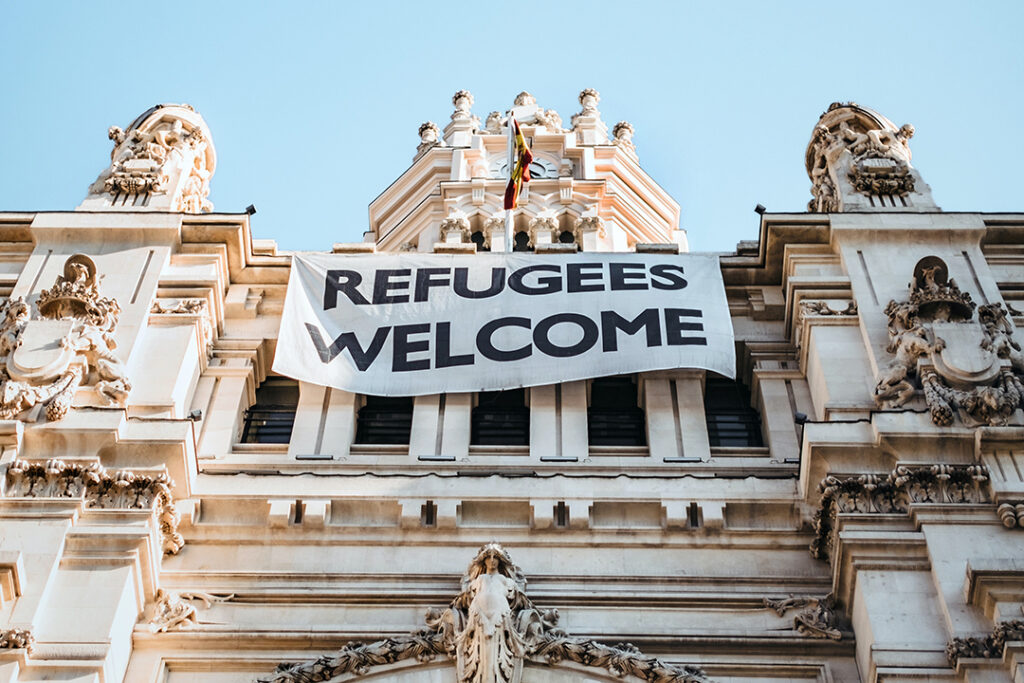Insights from the dashboard: Religion and migration in Europe
Insights from the dashboard: Religion and migration in Europe
Wars and other emergencies have forced countless people to migrate. Explore the EARS dashboard to learn about migration and the role of religion.
The EARS dashboard
The EARS dashboard is a tool you can use to explore a variety of trends relating to religion and society in Europe. It builds on a collection of summaries of articles that discuss these topics. The dashboard offers different insights into the occurrence of particular themes, their connections to other topics, and their link to global developments.
Migration on the EARS dashboard
An important recurring theme in the European news is migration. Violent conflicts and other humanitarian emergencies are driving people across borders. This has resulted in a refugee crisis which is also felt in Europe. Religious institutions are responding to this crisis with a commitment to help those who have been forced to migrate.[1]
When selecting migration on the EARS dashboard, the Venn diagram below pops up. It shows the various themes that are associated with migration in relation to religion in Europe.

Migration and religious institutions
As the EARS dashboard indicates, religious institutions play an important role in the refugee crisis. Numerous faith-based organisations have set up programs to aid refugees. For example, the Spanish branch of the Catholic charity Caritas has aided the transfer of over 5,000 Ukrainian refugees to Spain.[2] Churches in the German state of Bavaria have provided sanctuary to refugees from Bulgaria and Romania.[3]
In 2015, a group of Christian organisations in Italy launched the Humanitarian Corridors Project: the Community of Sant’Egidio, the Italian Federation of the Evangelical Churches, the Waldensian and Methodist Churches, and Diaconia Valdese. This ecumenical project aims to ensure the safe and legal passage of vulnerable people. After being transferred, refugees are provided with accommodation in various homes and shelters managed by the Christian founding organisations.[4] The project has since been implemented in several other European countries.[5]
Ethics and religious identity
As the EARS dashboard suggests, religious institutions are often moved to help refugees by considerations of ethics and religious identity. They are motivated to act by moral ideals that are essential to their faith. For many faith-based organisations, helping refugees is simply their religious duty. The founders of the Humanitarian Corridors Project, for example, spoke the following words: “Our faith requests it from us and it moves us to feed the hungry and give drink to the thirsty; we are allowed to do it by the existing laws that authorise the granting of visas for humanitarian protection reasons; it is a duty according to the cultural and legal tradition of Europe that was born and has been strengthened by establishing the principle of the protection of human rights and international protection.”[6]
Leadership
Appeals to ethics and religious identity can also be found in the rhetoric of religious leaders. Pope Francis recently visited Hungary to encourage Hungarians to “open their doors” to migrants.[7] He urged them to look beyond national borders, stressing that welcoming migrants is “a true sign of Christianity.”[8]
In a speech about the Humanitarian Corridors Project, Pope Francis stresses an important Christian ideal: “This service to the poor and to refugees and displaced people is also a powerful experience of Christian unity. In effect, the initiative of humanitarian corridors is ecumenical. It is an impressive sign of unity between brothers and sisters who share their faith in Christ.“[9]
With appeals to Christian values, Pope Francis calls for the welcoming reception of refugees.
Insights on religion and migration
As the EARS dashboard shows, the topic of migration intersects with religious institutions, ethics, religious identity, and leadership. Faith-based moral values motivate religious actors to stand up for migrants and refugees. Religious institutions set up programs to help vulnerable refugees, and religious leaders stress the importance of hospitality. Their religious identity incites them to welcome those who leave their homes to find security or a better life elsewhere. In this way, migration and religion are intimately connected.
Learn more on the EARS dashboard
The EARS dashboard allows you to gain insights into many topics, including those described above. It is a free tool that allows you to make connections like those described above, and to find out about relationships between interesting subjects across Europe. Please visit the dashboard to learn more.
Want to learn more about similar topics? Explore the EARS Dashboard
Sources
[1] European churches affirm Christian values of hospitality in response to refugee crisis
[2] Cáritas ha acompañado a 5.378 refugiados en España desde el inicio de la guerra en Ucrania
[3] SCHUTZ VOR ABSCHIEBUNG Hoffnung im Kirchenasyl
[4] The Third Way. Humanitarian Corridors in Peacetime as a (Local) Civil Society Response to a EU’s Common Failure
[5] The Necessity for Alternative Legal Pathways: The Best Practice of Humanitarian Corridors Opened by Private Sponsors in Italy
[6] Humanitarian corridors: an ecumenical project to welcome and integrate
[7] Paavi patistaa unkarilaisia avaamaan ovet maahanmuuttajille
[8] Paus in Hongarije: ‘Migranten aanvaarden is waar teken van christendom’
[9] “Humanitarian Corridors Are Bridges Of Salvation And Hope”






